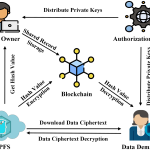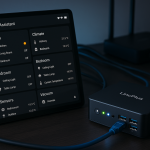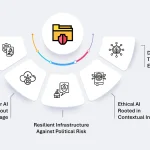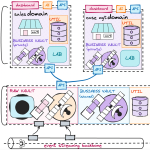
Blockchain offers a valuable tool to mobile app development companies that will help them engage more employees, collaborate better and work more efficiently by removing intermediaries and ensuring integrity of data.
Blockchain was originally developed for use in cryptocurrency transactions; today it can be found all over business as an efficient way of recovering secure and transparent digital-ledger transactions. Blockchain can reshape software development processes by improving security, transparency and trust.
Decentralization
The hack-proof and transparent technology known as blockchain, which underpins cryptocurrencies, could help solve those problems in software development. Blockchain’s decentralised ledger system prevents hackers from effectively altering the data; at the same time, the data is protected from tampering – ideal for every kind of system that maintains records, from voting to supply-chain software applications.
Thanks to blockchain’s immutability, developers could track changes, eliminate redundant work, increase efficiency and productivity, and reduce time-to-market by simplifying processes and eliminating intermediaries.
The second benefit of decentralization is that lower level managers take a more independent decision without asking their superiors in advance and achieving superior communication of the upper and lower management.Decentralization ensures a quicker responce of employees to market changes in terms of promoting business growth. It also provides opportunity to create new managerial culur to improve performing and growth of the employees individually.
Transparency
All of this is fine for small teams, but transparency becomes more difficult the larger the team gets – with different people preferring different processes, tools and domain knowledge, it’s easy to end up in a situation in which it’s often not at all obvious what everyone is working on.
It is its potential to revolutionise how software is developed, creating more transparent and decentralised workflows, and reducing delivery cycles by months.
Various software applications can be coded on blockchain, including in healthcare, finance and logistics. These could include supply-chain traceability, patient-data security and secure sharing between parties. Blockchain lets developers build more resilient, secure and scalable applications than before. Using blockchain can be a way to avoid being hacked or having your digital data improperly altered at any time.
Security
It became a train of thought; Blockchain offers not only security and resistance against tampering, two fundamental benefits when developing software, but also greater transparency; the cryptographic algorithms securing blockchain data make it essentially inpenetrable to any hacking; additionally, the decentralised model lowers the risk of data breaches by a third party.
The increased transparency is another significant strength, since all data on the network (ie, who sends what and when) is available in real time to all participants. For applications where extreme transparency is desirable, like supply chains or voting, this could be a considerable benefit.
It can also be used as a basis for smart contracts, which are agreements written as code where transactions are automatically enforced by the code itself. In this way, conditions of the contract can be spelled out (for example, a parcel of land being transacted will never be sold again, or only A can buy from B), and a lack of understanding of the language (or awareness about an existing contract) can’t be used to elude the stipulation – increasing both transparency and security. One application can be used to fulfill the other in a heartbeat; this can revolutionise software development – introducing transparency, security, decentralisation, fraud reduction and increased efficiency all in one shot.
Collaboration
By being immutable and transparent and allowing coders to get away from central servers, blockchain allows for faster work and better quality – with fewer bugs.
And thanks to technology, neither any one person can modify data nor gain access to applications – a huge advantage for any business operating in the corridors of highly scrutinised industries, from supply chains to medical transgressions, traffic violations, trade relations, agriculture e-commerce a history of electoral fraud.
Now if developers can create a project on Blockchain, and work remotely, travel expenses can be eliminated, time spent can be dramatically reduced and the productivity of a project can actually increase as a result of improved project management and communication processes.
Software development tech stacks have been radically reshaped by some of the new emerging technologies of blockchain and AI. Putting these tools together helps developers unleash unprecedented efficiencies at scale and drive collaboration.










